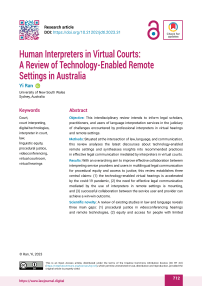Human Interpreters in Virtual Courts: A Review of Technology-Enabled Remote Settings in Australia
Автор: Ran Yi
Журнал: Journal of Digital Technologies and Law @lawjournal-digital
Рубрика: Государство и право. Юридические науки
Статья в выпуске: 1 (3), 2023 года.
Бесплатный доступ
Objective: This interdisciplinary review intends to inform legal scholars, practitioners, and users of language interpretation services in the judiciary of challenges encountered by professional interpreters in virtual hearings and remote settings. Methods: Situated at the intersection of law, language, and communication, this review analyses the latest discourses about technology-enabled remote settings and synthesises insights into recommended practices in effective legal communication mediated by interpreters in virtual courts. Results: With an overarching aim to improve effective collaboration between interpreting service providers and users in multilingual legal communication for procedural equity and access to justice, this review establishes three central claims: (1) the technology-enabled virtual hearings is accelerated by the covid-19 pandemic, (2) the need for effective legal communication mediated by the use of interpreters in remote settings is mounting, and (3) successful collaboration between the service user and provider can achieve a win-win outcome. Scientific novelty: A review of existing studies in law and language reveals three main gaps: (1) procedural justice in videoconferencing hearings and remote technologies, (2) equity and access for people with limited proficiency in the official language of the court system, and (3) effective legal communication mediated by human interpreters in virtual courts. This review bridges the existing gaps in knowledge. Practical significance: it touches on three aspects of the law-language nexus: (1) Covid-19 accelerated adoption of the virtual courtroom technologies in Australia and its impact on court interpreting, (2) challenges for interpreters in remote settings, and (3) achieving linguistic accuracy and intercultural appropriateness when preserving the manner in which the content is expressed as intended or implied by the original speaker. Grounded in courtroom interpreting practices, it highlights the importance of effective collaboration in successful multilingual legal communication rooted in mutual purpose, shared expectations, and interprofessional understanding.
Court, court interpreting, digital technologies, interpreter in court, law, linguistic equity, procedural justice, videoconferencing, virtual courtroom, virtual hearings
Короткий адрес: https://sciup.org/14127547
IDR: 14127547 | DOI: 10.21202/jdtl.2023.31


